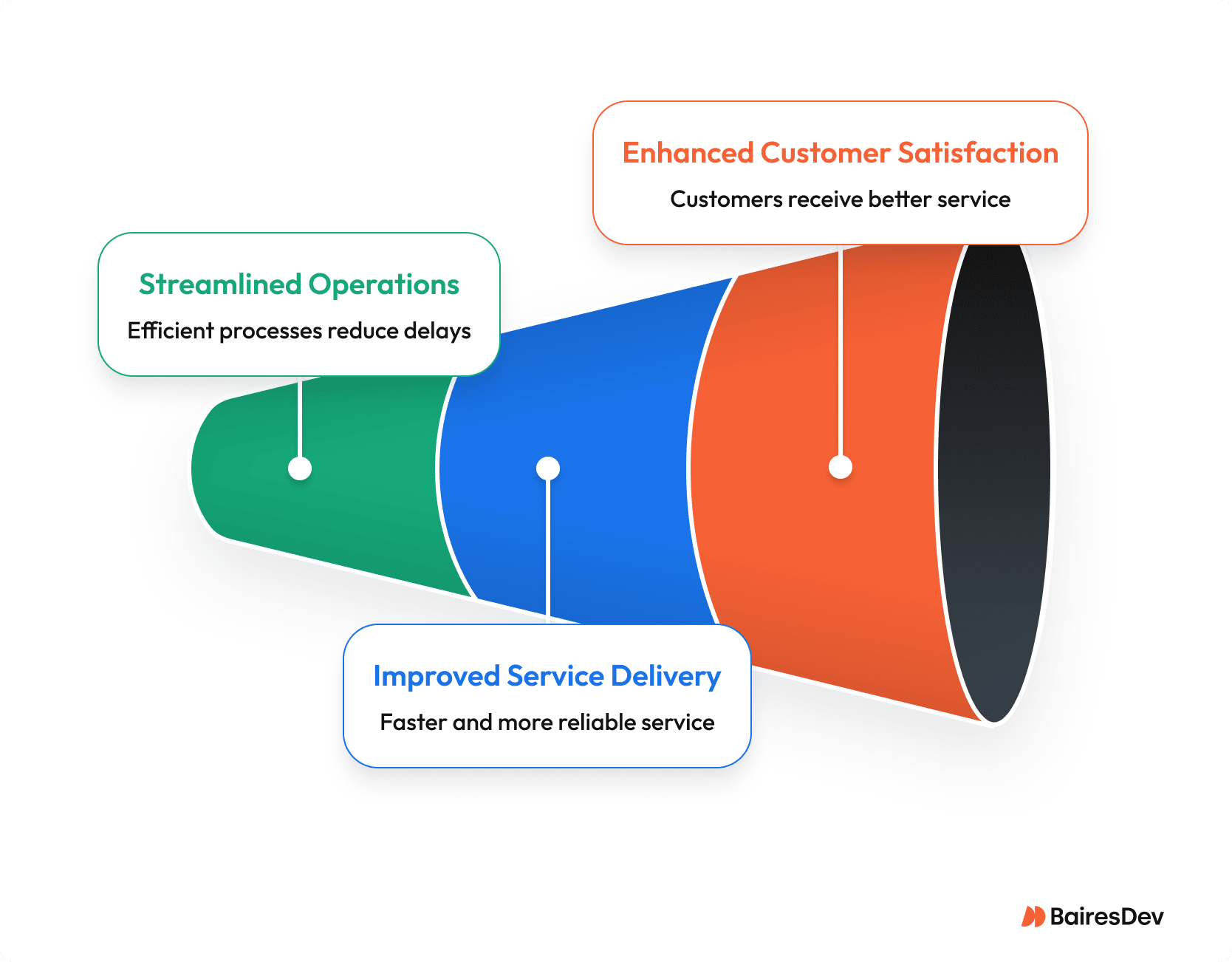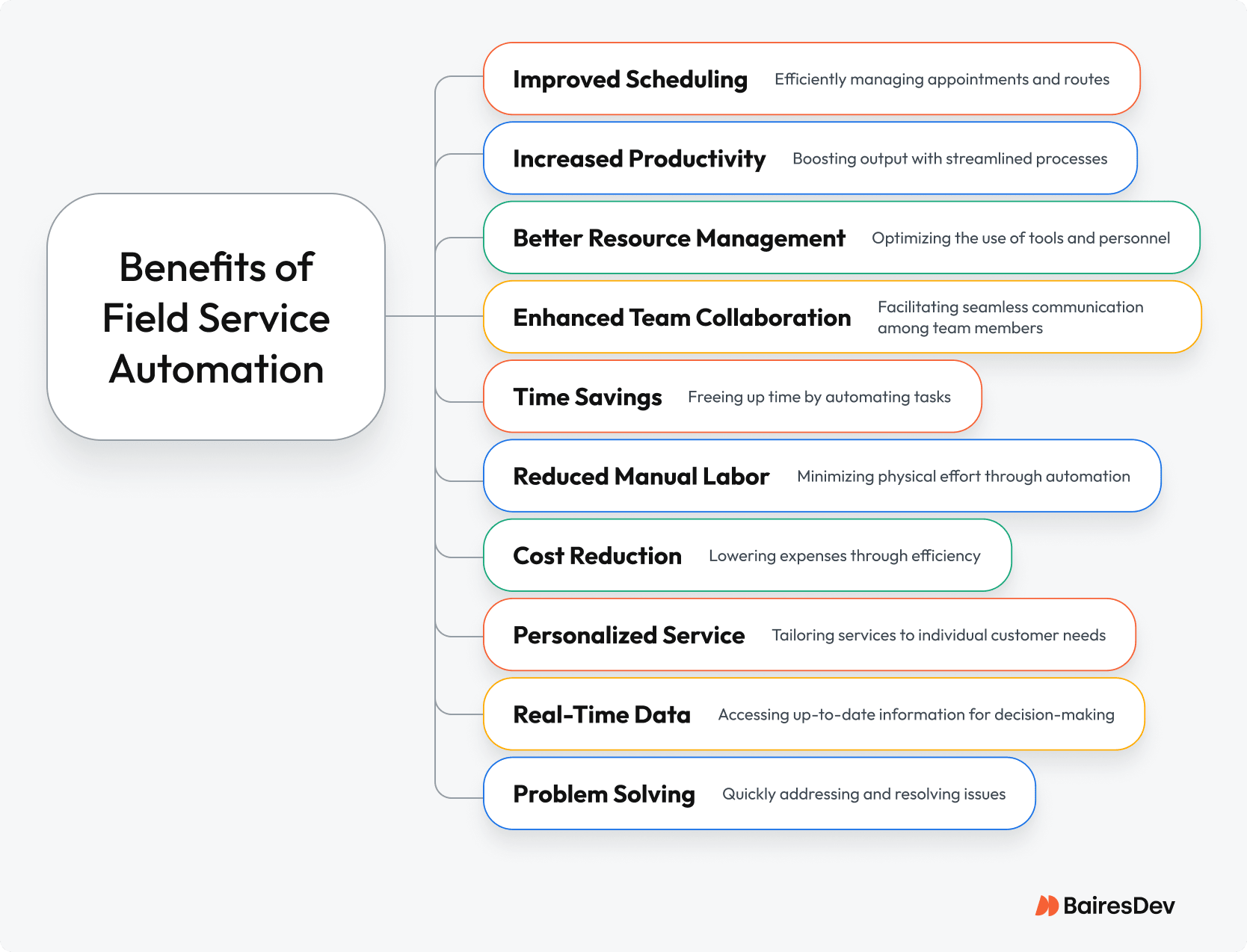According to The Service Council‘s 2021 report, 70% of field service technicians have said that customer and employer demands have increased while 75% said their own products are requiring an increasing amount of technical knowledge.
Given that these professionals must be able to do their jobs efficiently and meticulously while working toward meeting their businesses’ goals, it’s clear that they need help. The answer, for many organizations in the field service industry, is automation.
Field service companies leverage analytics and reporting to enhance efficiency and performance, leading to improved workflow efficiencies and customer satisfaction.
Introduction to Field Service
Field service encompasses the activities and tasks performed by organizations to install, maintain, and repair products or equipment at customer locations.
These operations involve managing and coordinating the work of field technicians, who are responsible for delivering high-quality service to customers. Effective service management is critical to reducing operational costs and improving overall service quality.
Automation software can help organizations streamline their field service operations, improve efficiency, and enhance customer satisfaction. By automating repetitive tasks and providing real-time data, field service automation solutions enable organizations to make data-driven decisions and improve their overall service delivery. This software can also help manage inventory, schedule and dispatch technicians, and track job statuses and interactions.
The goal of field service automation is to provide better customer service, improve operational efficiency, and increase customer satisfaction. It can also help organizations reduce their operational costs, improve response times, and increase first-time fix rates. By leveraging automation, organizations can enhance their overall efficiency and provide high-quality service to their customers.

Automation is an essential component of any organization’s service strategy, enabling them to deliver exceptional customer experiences and stay competitive.
What Is Field Service Automation?
Also called field service management, field service automation refers to the use of technology to handle tasks that were previously completed manually in industries that require routine field support. In other words, it indicates contexts in which technicians or professionals are routinely deployed to resolve problems, complete tasks, or otherwise serve clients or customers.
The umbrella term covers all processes, procedures, policies, and workflows involved. The technology allows organizations to streamline and organize activities such as:
- Dispatching technicians based on their qualifications
- Providing job details to technicians
- Utilizing automated scheduling
- Implementing field service software
- Using scheduling software
- Managing field operations
- Understanding how field service automation works
- Handling service requests
- Accessing service history
- Monitoring technician performance
- Applying route optimization
- Automating routine tasks
- Enhancing workforce management
- Using technology to streamline field operations
- Leveraging mobile field service apps
No matter what tools you use, the goal of the automation is to simplify complex processes, reducing the number of steps involved and eliminating redundancies.
Field Service Automation Software
At the heart of field service network automation is the field service management software that enables the processes and activities to take place.
A management platform typically integrates a number of the procedures and tasks listed above into a single tool, allowing organizations to view and access all the information in one place and handle assignments quickly and efficiently.
You can automate your services through the use of a field service automation solution, which may be accessible via a number of devices, including mobile and desktop. Given that most automation solutions are cloud-based, they are usually accessible from practically anywhere with an internet connection. Many are equipped with user-friendly interfaces that enable easy use.
Integrating new solutions with existing systems helps eliminate silos and enhances data visibility within organizations.
Customer Relationship Management
Customer relationship management (CRM) is a critical component of field service management, as it enables organizations to manage their interactions and relationships effectively. Field service automation software can help organizations manage their customer data and provide personalized services.
By leveraging CRM capabilities, organizations can improve their quality of their service, increase customer loyalty, and drive repeat business. Automation solutions can also help manage customer expectations, provide real-time updates, and deliver proactive service to customers. Effective CRM is essential to building strong relationships and driving business growth.
Field service automation software can help organizations automate their CRM processes, improve customer engagement, and provide new experiences. By integrating CRM with field service automation, organizations can gain a 360-degree view of their customers and deliver personalized service. These solutions can also help manage customer complaints, resolve issues quickly, and enhance overall operations.
CRM is a critical component of service management. By leveraging field service automation software, organizations can improve their CRM capabilities and maintain their competitiveness.
Benefits of Field Service Automation

When you automate field service workflows, you will reap plenty of rewards. They include:
Enhanced Operational Efficiency
Field service automation significantly improves efficiency by streamlining scheduling, dispatching, tracking, reporting, and inventory management. This not only reduces the time spent on administrative tasks but also ensures that all necessary information is readily available before arriving at the job site.
Improved Scheduling and Dispatching
Automation also allows companies to monitor key performance indicators (KPIs) to evaluate the effectiveness of their operations. Efficient routing ensures that technicians can reach their destinations quickly, reducing travel time and improving response times.
Increased Productivity
Field service automation plays a crucial role in improving efficiency by automating routine tasks and reducing the time spent on manual processes. Preventive maintenance allows customers to proactively request services before any issues arise, ensuring timely and effective service delivery.
Better Resource Management
Automation enhances employee productivity by streamlining tasks and reducing time spent on administrative duties. Technicians can manage documentation digitally, minimizing paperwork and ensuring that all necessary information is easily accessible.
Enhanced Team Collaboration
High-performing service teams leverage automation to improve productivity and customer experience. Mobile devices enable technicians to access job details, customer information, and real-time updates, streamlining communication and reducing reliance on paperwork.
Gaining Back Time
One of the chief benefits of automation is that it reduces the amount of time individuals and their entire organizations need to spend on tasks, allowing them to focus on more complex responsibilities that require human intervention. Scheduling, assigning, data collection and evaluation, and more can be done automatically and seamlessly, putting hours back into workers’ days.
Eliminating Unnecessary Manual Labor
Businesses that demand field service work are used to dealing with mountains of paperwork, manual entry, and other tedious tasks. Human workers no longer need to handle these time-consuming assignments and responsibilities. Instead, machines take over the rote, repetitive labor.
Reducing Costs
When your employees aren’t spending an enormous amount of time on tedious tasks, you will actually end up saving money. While automation is an investment, it’s an extremely cost-effective one. In the long run, you will be able to reduce costs by having technology take care of responsibilities that humans previously had to undertake, meaning you won’t have to pay employees for time, say, entering and logging status updates.
Personalizing Service
This software better equips you to store and assess customer information, allowing you to respond to consumer demands quickly and efficiently. You can also appeal to specific customer concerns and resolve individual queries.
With a customized approach, consumers will be happier with the level of service they receive and, it stands to reason, remain loyal to your company, as well as recommend your business to other people.
Receiving Real-Time Data
We live in the age of Big Data, when information is everywhere we look. Unfortunately, not everyone knows how to use that data appropriately.
Having a field service automation platform will not only provide you with a wealth of actionable information in real time, but it will also give you insights through reports and thorough dashboards that will enable you to use that data to improve your services, assess the quality, see how individual team members are performing, and much more.
Solving Problems
A technician with an inadequate skill set is deployed for a job they can’t complete. The directions on how to get to the site are unclear. The employee doesn’t have the appropriate tools to do the job correctly. The wrong price is quoted for the work at hand. A ticket isn’t properly recorded and an agent isn’t assigned.
These are just some of the many problems that can occur when you’re relying on a manual system for your field work. Humans are prone to error, of course. And this can wreak havoc on even the most carefully-honed system. But an automated platform resolves many of these issues and more, helping a company maintain accuracy and allowing it to perform work carefully and consistently.
Field Service Technology Companies
There are many existing field service technology companies that deliver products that solve challenges for the field across sectors. Some of these products are:
- Azuga Fleet
- Field Nation
- FieldEdge
- Fieldpoint
- Housecall Pro
- Jobber
- Quickbase
- Salesforce Field Service
- Service Autopilot
- Service Fusion
- ServiceTitan
- simPRO
- Skedulo
- Successware
- Workiz
- Zuper
Existing field service automation solutions often incorporate machine learning to enhance efficiency and effectiveness. These solutions improve the management of service calls, ensuring timely and organized responses. Mobile applications within these systems allow field technicians to capture data seamlessly, promoting better workflow and communication.
Automating field service processes leads to significant benefits, including cost savings and improved customer satisfaction. Field service organizations can greatly benefit from these technologies, addressing traditional operational challenges and improving overall performance.
But those looking for customized software can turn to outsourcing companies that specialize in delivering personalized tools that streamline business automation for field service.






